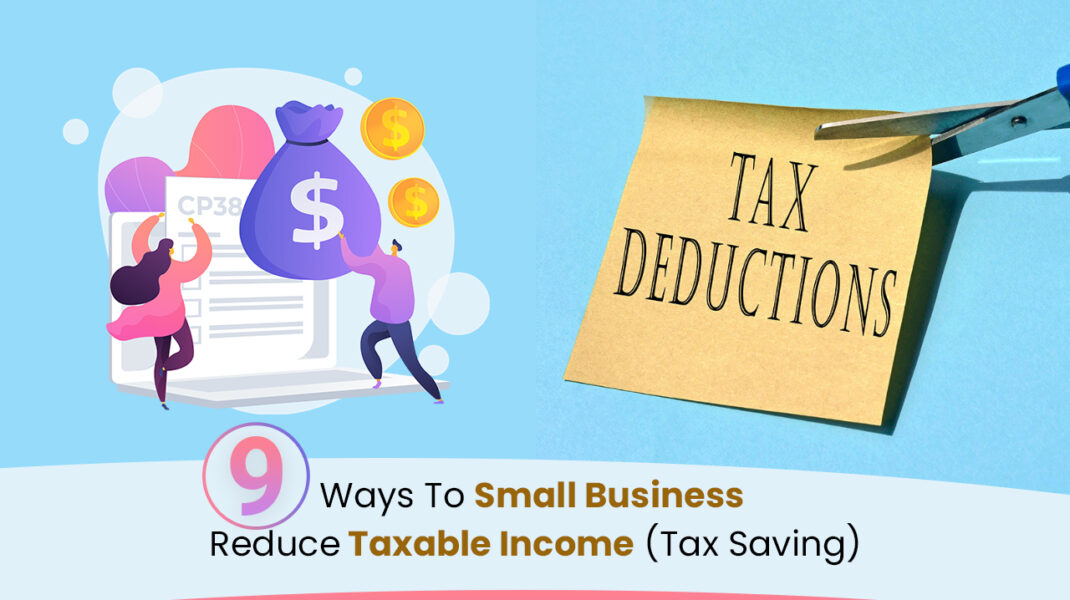9 Ways To Small Business Reduce Taxable Income (Tax Saving)

Reducing taxable income is an essential part for small businesses that want to save every earned dollar and make it reinvest into their business. To keep the revenue and reinvest the money back into business, you will have to opt for wise tax planning. If you want to reduce the taxable income of your small business, this article will walk you through the best tips of tax-saving strategies to not only reduce taxes on your hard-earned business income but also deduct other business expenses.
There are several tax exemptions and tax credits, which can be utilized to reduce taxable liability.
9 Tips to Reduce Taxable Income For Businesses
How to reduce taxable income of your small business using the following tips:
1. Make Contributions to a Retirement Plan

One of the most effective ways to reduce the taxable income of your small business is by adding funds to your retirement account. If you are getting a large tax bill from your accountant, you can leverage your small business retirement plan to benefit with tax deductions and reductions in the total taxes owed for the prior year.
As a business owner, you need to be more proactive with tax planning and make sure your retirement plan should comply with your tax plan. There are several retirement plans for small business owners including the SEP-IRA, Solo 401(k) plan, and cash balance pension plans. So, depending on the type of retirement plan you set up, and taxable income, you can significantly reduce your current tax liability.
Each retirement plan you will set up comes with different rules. The amount will depend on your age, income, and business structure. You can check the variety of retirement plans on the IRS website and use them for your tax-saving strategy.
2. Employ a Family Member
Hiring a family member (spouse, children, etc.) for your business allows you to a reduction on taxable income and save taxes. There is a variety of options internal revenue service (IRS) allows you to opt for with the potential benefit of protecting your income from taxes. Hiring children can be beneficial for small business owners to be able to pay a lower marginal rate or eliminate the tax on the income paid to their children.
For instance, the benefit of employing children can allow sole proprietorships need not pay for social security and medicare taxes. Your spouse can also be able to put aside the retirement savings depending on the benefits they may have through another job
3. Start Medical Plan

Starting out a medical plan for you and your family is also one of the best ways to reduce taxable income. You can save taxes by putting funds into health savings account for healthcare needs. The medical costs will continue to grow and help you reduce taxes. Moreover, every business owner and employee should explore utilizing an HSA not only to minimize taxes but also associated medical costs.
4. Change Your Business Structure
Changing your business structure can help you reduce taxable income. Small businesses don’t get the benefits of an employer in terms of paying taxes in portions. Rather, they need to pay the entire amount of social security and medicare taxes. So, it is better to have your business taxed as a limited liability company (LLC), because you may be able to eliminate the employer half of those two tax responsibilities. However, there are also a few things associated with this switch such as you need to pay yourself a reasonable salary and keep in mind other associated risks. Changing your business structure into LLC can help you reduce taxable liability.
5. Deduct Travel Expenses

If your business requires you to travel a lot, you may be able to reduce the business taxes. While business travel expenses are fully deductible, personal travel doesn’t. However, personal travel should align with the justifiable business purpose in order to enjoy the benefits of a small business owner. So, frequent flyer miles earned from business travel can also be redeemed for personal travel.
6. Reinvest in Marketing
Reinvesting into your marketing plan can also help you reduce taxable income. Growing your business through better marketing and reaching out to more customers with digital marketing. Digital marketing has become a faster way to bring in more leads in small businesses and convert them into customers. IRS has allowed a tax deduction for marketing expenses. So, it creates a win-win situation for small business owners. If you want to save taxes while growing your revenue, reinvesting funds into marketing would be a good idea.
7. Home Office Deductions

Home office deduction is applicable when the portion of your home is exclusively used for your business trade and operations. That part of your home must be your principal place of business where you are meeting your clients, patients, or customers in the ordinary course of your business or a separate structure used in connection with your trade or business. You need to have records of your expenses and the portion of your home used to get the deductions.
8. Business Vehicle Expenses
Taxes or expenses on the vehicle used exclusively for business purposes can be deductible. This can also include your auto lease payments, interest on your car loan, gas, parking, maintenance, and even repairs.
If the vehicle is used for both personal and business, the deductions will be accountable to the company portion. If such cases, you will want to keep all records updated to justify the amount of business use.
9. Legal and Professional Services
Tax saving strategies can also allow you to deduct taxes on legal and professional services. Passing on a few business responsibilities to other professionals will allow you to reduce taxable income from the business. Whether you are paying for bookkeeping, consultants, attorney, or even HR personnel, you add up these services to reduce your business cost. Luckily, this will lower the net cost when your accountant can deduct these expenses from your business income.
The Bottom Line
Wise planning can help you reduce your taxable income as a small business owner and save funds to invest in the other areas of your business. You’ll find the given tips work for you when being mindful before making tax-saving decisions. If you wondering to grow your business, tax reductions and Gconnectpro financial services will be the best bet for you.
FAQs
Which is a recommended way to reduce your taxable income?
One of the most effective way and beneficial ways to reduce your taxable income is to contribute to a pre-tax retirement account such as an employer-sponsored 401(k) or traditional IRA.
What are the different types of taxes you might be responsible for?
The kind of small business taxes you pay depends on the entity type of your business. The taxes include local, state, and federal taxes. Depending on your type of business, you may owe estimated taxes, Excise taxes, Income tax, Self-employment tax, Sales Tax, Social Security tax, Medicare (FICA) tax, or Real Estate tax.
How often do I pay taxes as a small business owner?
As a small business owner, you should make estimated tax payments on your business income every quarter. You’re expected to pay taxes if you think you’ll owe at least $1,000 on your tax bill for the year. Estimated taxes include income taxes and self-employment taxes. While Income taxes include all of the taxes you owe for the income you earn, including investment returns, business profits, and wages, on the other hand, Self-employment taxes includes withholdings from a paycheck.


Write a reply or comment
You must be logged in to post a comment.